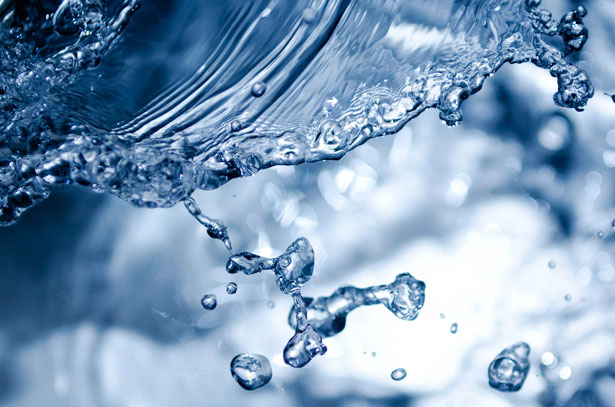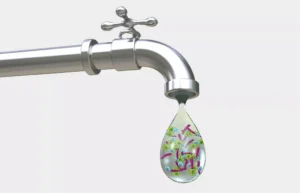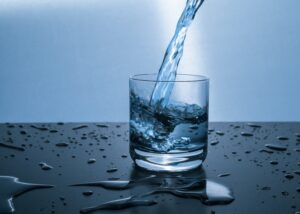 Water. The most essential, yet overlooked, nutrient. Some people tout that water increases our metabolism, especially when it is cold water and our body has to spend energy warming it up. People believe that water helps with constipation. Some believe water “flushes” our body out and removes toxins. Some say that water decreases hunger, and we should drink water to stay full. Some, although few, even say that water intake is related to the occurrence of certain cancers. So, how many of these beliefs are facts, and how many are myths? Let’s find out!
Water. The most essential, yet overlooked, nutrient. Some people tout that water increases our metabolism, especially when it is cold water and our body has to spend energy warming it up. People believe that water helps with constipation. Some believe water “flushes” our body out and removes toxins. Some say that water decreases hunger, and we should drink water to stay full. Some, although few, even say that water intake is related to the occurrence of certain cancers. So, how many of these beliefs are facts, and how many are myths? Let’s find out!
The importance of water
Water is the reason we are able to regulate our body temperature and keep it at a constant 98.6 °F. Water is necessary for almost all cellular reactions in our body, and without it, life would cease to exist. We all know how important water is for survival, but there seems to be confusion about how much we need. I often hear and read that we need 8 cups a day, but I am not sure where that amount comes from.
While humans can go weeks without food, a water deficit of just a few percent can impair physical performance; a slightly increased deficit will bring about symptoms of tiredness, headaches, and a general ill feeling, while a loss of 20–30% of total body water is enough to cause death (1). Death is likely after just a few days without any water.
Water makes up between 50 and 70 percent of our body weight. It is released into the air through respiration, is lost in sweat, is lost from chemical reactions going on all of the time inside our body, and is lost in urine and feces (1). These pathways of water excretion are what scientists use to measure how much water we need each day.
How much water do we need?
The Food and Nutrition Board of the IOM sets water needs based upon adequate intake (AI) (1). The AI is assessed based on studies and is meant to meet the water needs of nearly all members of a healthy population (1). Fluid needs vary throughout life and increase with age.
The adequate intake (AI) was set at 3.7 L (about 16 cups or 1 gallon) a day for males and 2.7 L (12 cups) a day for females, regardless of age (1). Athletes obviously have higher water requirements. A few examples of water loss for various sports are: cycling losing an average of 3.34 cups per hour; running losing 4.64 cups per hour; basketball losing 4.65 cups per hour; and soccer losing 4.94 cups per hour (1).
A diet high in protein or salt will result in an increased need for water. Ingested salt may retain water, making your body appear swollen while increasing water needs. When we need water, the kidneys conserve the water we have by forming more concentrated urine; when we have excess water, the kidneys get rid of it by producing dilute urine (1). Our body cannot store excess water, and the kidneys are largely responsible for getting rid of the excess in urine.
Eight cups a day?
In regards to the “8 cups a day” water recommendation, a thorough review on the subject concluded that nobody really knows how much we need, and the 8 cups a day is not based on any single study, while many different researchers have come up with different answers (2).
Effects of dehydration
We do have some data showing that even mild dehydration (body mass deficits as little as 1-2%) can cause negative subjective symptoms such as dry mouth, tiredness, headache, and decreased urine output (3, 4). Even at this small deficit, self-rated alertness and the ability to concentrate decline with an increasing deficit, while ratings of tiredness and headache increase (3). Some data suggests that cognitive processes like decision-making and reaction time suffer from low levels of dehydration (5). This could obviously lead to injury in games where reaction time is important, like football, or even tripping and falling while running. Studies have shown that a fluid deficit prior to exercise can have a significant impact on performance, mostly on aerobics (running, football, etc.) rather than muscular strength (weight lifting).
The link between dehydration and dementia in the elderly
When dealing with the elderly, small amounts of dehydration can have a more significant impact on cognitive functions than in younger adults (6). Pre Existing dementia and confusion in the elderly can be worsened with mild to severe dehydration (6). There is data showing that it is common for confused elderly patients admitted to care to be suffering from fluid deficiencies. This is important to focus on if you are caring for an elderly person, as they often have reduced thirst responses (so they cannot tell when they are thirsty) and a reduction in renal (kidney) function (6).
Does dehydration cause constipation?
Although this is a commonly held belief, studies have shown that increased water intake does not relieve constipation unless the person is dehydrated (7). This means that a lack of water can certainly cause constipation, but there are other causes as well. If one is hydrated and constipated, drinking water will be of little use. Physical activity and dietary fiber are also very important in preventing constipation (7). It can also occur if we wait too long to defecate. As the stools stay in the large intestine, water is continuously taken from the stools, so the longer we wait, the more water is removed, and the drier and harder it becomes to pass the stools. Not having enough water can produce the same result: dry stools, which are very difficult to pass.
Are you dehydrated? Look at the color of your urine.
Every person’s body is different, and listening to our body is more useful than following any guidelines about how much water to drink. A typical sign of dehydration is a dry mouth. If you have dry mouth and it is not from some medical condition, you are likely dehydrated and should increase your water intake. Urine color is also a great indicator of hydration status. Darker urine is usually indicative of poor hydration status (8). When we are dehydrated, our kidneys conserve all the water they can and concentrate our urine.
Although our urine is full of bacteria, yeast, sugars, and excess protein, its yellow color is mostly derived from a pigment called urochrome, and when we are dehydrated, this pigment gets more concentrated, thus giving the urine a darker yellow color. When we are well hydrated, the kidneys release excess water, diluting the urochrome and giving the urine a light yellow or clear shade (9). To see what is meant by dark yellow, when you first use the bathroom in the morning, look at your urine color, as this is our most concentrated urine of the day (since we went all night without water).
Does water remove toxins?
Another idea is that increased water consumption helps the kidneys remove toxins. This has not been proven, but it is possible that higher water intake may cause more sodium excretion in urine and help lower blood pressure (2). Short-term, increased water intake may impact the kidneys clearance of various substances, whose identities we are not completely sure of (2). More research is needed in this area, but it seems possible that increased water intake could cause more toxins to be removed.
Water intake and cancer?
It is possible, although extremely hard to study and not backed up by much evidence, that chronic, mild daily dehydration can affect certain cancer, cardiovascular, and diabetes risks (10). There is some evidence linking insufficient daily fluid intake to bladder and colon cancer (10, 11). As there are few studies backing up these claims, I cannot agree with them, although I think it is interesting to consider nonetheless.
Does water decrease appetite?
Unfortunately, there are hardly any studies addressing this issue. A study found that drinking water but not drinking glasses of water decreased appetite. But looking back at the blog I wrote about satiety from beverages, it seems unlikely that water would decrease our appetite. Water has no calories, and because of this, it is unlikely that it activates the mechanisms telling our body that we just ingested a food or drink with calories. It is hard to give a definite answer on this subject, and further research should be conducted because if water decreases appetite, it can be effectively used by those who are overweight.
Does water increase metabolism?
Almost all of the studies say no, although one study from 2003 found that drinking water increased energy expenditure by 30% (12). The researchers concluded that drinking 6.34 cups of water a day would cause us to burn an additional 50 calories per day (12). They found that drinking cool water increased energy expenditure by 40%! A 2006 study found no effect of drinking water on energy expenditure (13). They even used water that was significantly colder than that used in the previous study. Seven previous studies also found no effect of water on energy expenditure (13). Therefore, it seems unlikely that drinking water can increase our energy expenditure. Even if it does, it is most likely not enough calories to actually induce weight loss, so I would not rely on drinking water to help burn additional calories!
Does caffeine promote water loss?
I have always believed that since caffeine is a diuretic (it promotes urine loss), it increases water loss. I thought that the people who said coffee counts as part of our daily fluid intake caved in when they realized our society would never give up coffee. According to the Coca-Cola Company, I am wrong. Research has shown that coffee, tea, and other caffeine-containing beverages do not increase urine output (14). As mentioned, this study was funded by the Coca-Cola Company, so I am not sure if I trust the results. It is very convenient that the study found that caffeinated beverages like soda do not dehydrate us and actually contribute to our water intake. Without any other studies on these issues, this is unfortunately all we have to work with.
Drink small amounts of water throughout the day.
So how much water can our body retain at once? Is drinking large volumes of water in a short period of time a waste of time and almost entirely excreted in urine? Studies support this idea. It has been found that a water load drank over 15 minutes is mostly excreted in urine, while a water load drank over 2.5 hours is mostly retained by our body (2, 15). When water is drunk with a food that is absorbed slowly (such as certain sugars), water absorption is also slowed down in the gut, and we retain more water, while water drunk with a food that is absorbed quickly will be mostly excreted in urine (2). Keep in mind that these studies are examining the short-term effects of water absorption and do not give us insight about the long-term effects of drinking various amounts of water.
Closing remarks
Measuring water balance is very difficult. A 2011 study concluded:
“Measuring the total fluid water consumption of free-living people is fairly new, the state of the science is poorly developed, the data are most likely fairly incomplete, and adequate validation of the measurement techniques used is not available.” (16).
Do not obsess over getting the exact amount of water each day that is recommended. There is great variation in physiology between each person. Use signs of dehydration, such as dry mouth, dark urine, decreased urine output, and tiredness, to determine if you need more water. When engaging in activities that result in large amounts of sweating, make sure to rehydrate. It does not appear that “the more water, the better,” as many people think. Water is unlikely to flush out additional toxins once you are adequately hydrated; water does not decrease appetite; and water is unlikely to increase our metabolism. It cannot be said for certain whether or not caffeinated beverages count towards our water intake, so make sure to drink ample amounts of pure water throughout the day!
Sources
- Sawka, M. N., Cheuvront, S. N., & Carter, R. (2005). Human water needs. Nutrition reviews, 63(s1), S30-S39.
- Negoianu, D., & Goldfarb, S. (2008). Just add water. Journal of the American Society of Nephrology, 19(6), 1041-1043.
- Gorelick, M. H., Shaw, K. N., & Murphy, K. O. (1997). Validity and reliability of clinical signs in the diagnosis of dehydration in children. Pediatrics, 99(5), e6-e6.
- Dehydration. (n.d.). Symptoms. Retrieved September 23, 2014, from http://www.mayoclinic.org/diseases-conditions/dehydration/basics/symptoms/con-20030056
- Gopinathan, P. M., Pichan, G., & Sharma, V. M. (1988). Role of dehydration in heat stress-induced variations in mental performance. Archives of Environmental Health: An International Journal, 43(1), 15-17.
- Cole, M. G. (2004). Delirium in elderly patients. The American journal of geriatric Psychiatry, 12(1), 7-21.
- Müller-Lissner, S. A., Kamm, M. A., Scarpignato, C., & Wald, A. (2005). Myths and misconceptions about chronic constipation. The American journal of gastroenterology, 100(1), 232-242.
- Mentes, J. C., Wakefield, B., & Culp, K. (2006). Use of a urine color chart to monitor hydration status in nursing home residents. Biological research for nursing, 7(3), 197-203.
- Feature, S. (n.d.). Urine Color, Odor, and Your Health. WebMD. Retrieved September 25, 2014, from http://www.webmd.com/urinary-incontinence-oab/features/the-truth-about-urine
- Maughan, R. J. (2003). Impact of mild dehydration on wellness and on exercise performance. European Journal of Clinical Nutrition, 57, S19-S23.
- Shannon, J., White, E., Shattuck, A. L., & Potter, J. D. (1996). Relationship of food groups and water intake to colon cancer risk. Cancer Epidemiology Biomarkers & Prevention, 5(7), 495-502.
- Boschmann, M., Steiniger, J., Hille, U., Tank, J., Adams, F., Sharma, A. M., … & Jordan, J. (2003). Water-induced thermogenesis. The Journal of Clinical Endocrinology & Metabolism, 88(12), 6015-6019.
- Brown, C. M., Dulloo, A. G., & Montani, J. P. (2006). Water-induced thermogenesis reconsidered: the effects of osmolality and water temperature on energy expenditure after drinking. The Journal of Clinical Endocrinology & Metabolism, 91(9), 3598-3602.
- Grandjean, A. C., Reimers, K. J., Bannick, K. E., & Haven, M. C. (2000). The effect of caffeinated, non-caffeinated, caloric and non-caloric beverages on hydration. Journal of the American College of Nutrition, 19(5), 591-600.
- Shafiee, M. A., Charest, A. F., Cheema-Dhadli, S., Glick, D. N., Napolova, O., Roozbeh, J., … & Halperin, M. L. (2005). Defining conditions that lead to the retention of water: the importance of the arterial sodium concentration. Kidney international, 67(2), 613-621.
- Popkin, B. M., D’Anci, K. E., & Rosenberg, I. H. (2010). Water, hydration, and health. Nutrition reviews, 68(8), 439-458.




What are your personal comments about drinking “Gatorade” for dehydration? Good or bad choice?
Hey Bernal. I would not recommend Gatorade unless you run for more than an hour. Water is the best drink if you are not running or playing sports for a few hours. Gatorade has a lot of sugar added to it. There is Gatorade now that has artificial sweeteners which you could drink if you do not like water much. But I am sure you already know my opinion on artificial sweeteners! Stick with water if possible
I normally drink a lot of water and some days I just don’t; and I can feel the difference. I feel so much better and energized when I drink plenty of water. I even feel that my skin and lips look better (not dry nor chapped LOL) and this is just by drinking water… I just think the more water I drink the better for me. 🙂
What is your opinion on water pills? I know of women who take them to shed some pounds before an event. Is that dangerous? Could it lead to dehydration?